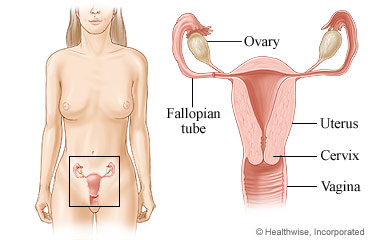Abnormal Uterine Bleeding in Teens: Care Instructions
Overview

Abnormal uterine bleeding is irregular bleeding from the uterus. It may be bleeding that is heavier, lighter,
or lasts longer than your usual period. Or it may be bleeding that doesn't occur at your regular time.
Sometimes it's because of changes in hormone levels or bleeding disorders. Sometimes a cause cannot be found.
You may have bleeding when you are not expecting your period. Your doctor may suggest a pregnancy test.
Follow-up care is a key part of your treatment and safety. Be sure to make and go to all
appointments, and call your doctor if you are having problems. It's also a good idea to know your test results
and keep a list of the medicines you take.
How can you care for yourself at home?
-
Be safe with medicines. Take pain medicines exactly as directed.
-
If the doctor gave you a prescription medicine for pain, take it as prescribed.
-
If you are not taking a prescription pain medicine, ask your doctor if you can take an
over-the-counter medicine.
-
You may be low in iron because of blood loss. Eat a balanced diet that is high in iron and vitamin C.
Foods rich in iron include red meat, shellfish, eggs, beans, and leafy green vegetables. Talk to your doctor
about whether you need to take iron pills or a multivitamin.
When should you call for help?
 Call 911
anytime you think you may need emergency care. For example, call if:
Call 911
anytime you think you may need emergency care. For example, call if:
Call your doctor now or seek immediate medical care if:
Watch closely for changes in your health, and be sure to contact your doctor if:
Current as of: November 27, 2023
Content Version: 14.0
Care instructions adapted under license by your
healthcare professional. If you have questions about a medical condition or this instruction, always ask
your healthcare professional. Healthwise, Incorporated disclaims any warranty or liability for your use of
this information.